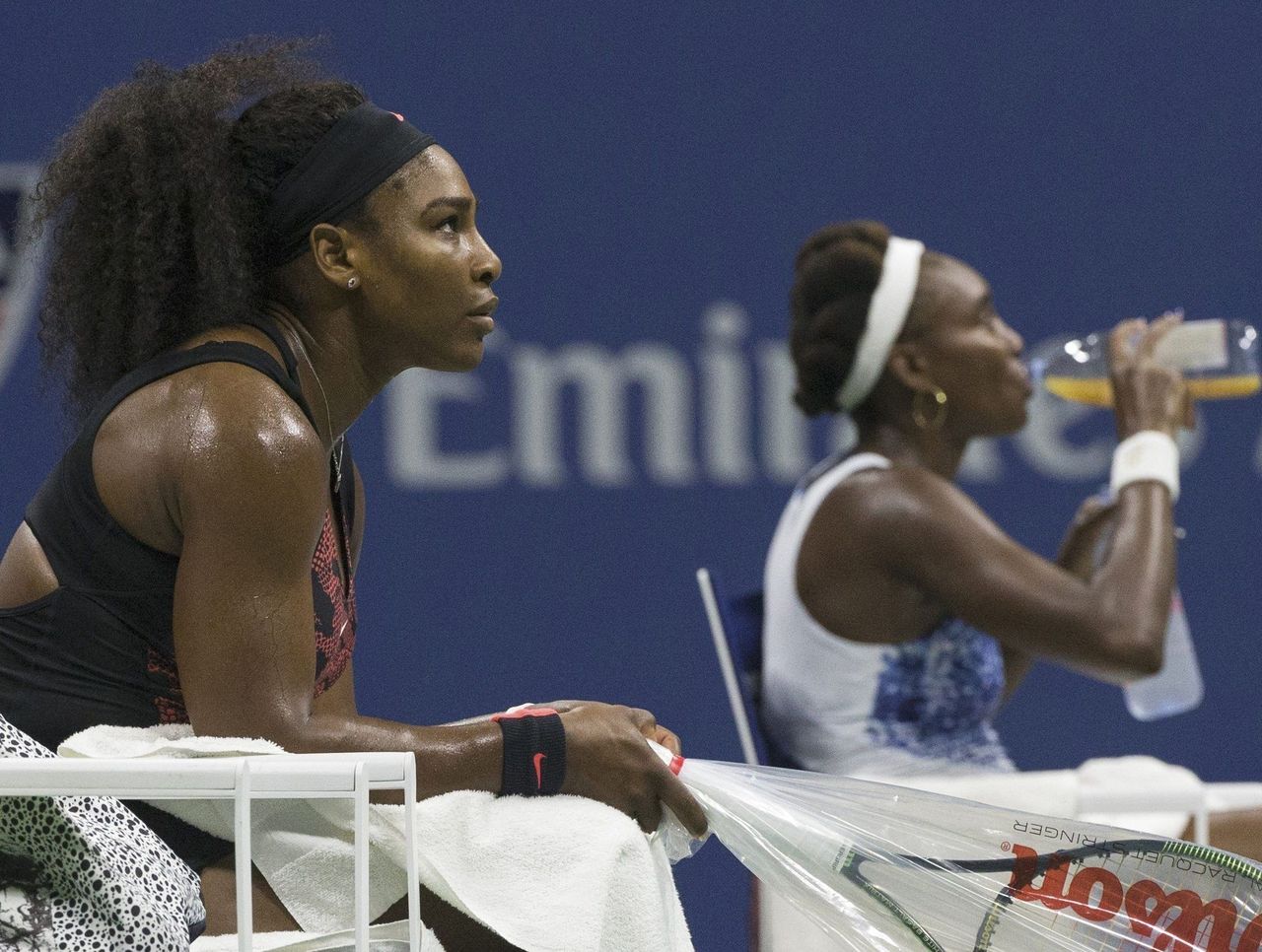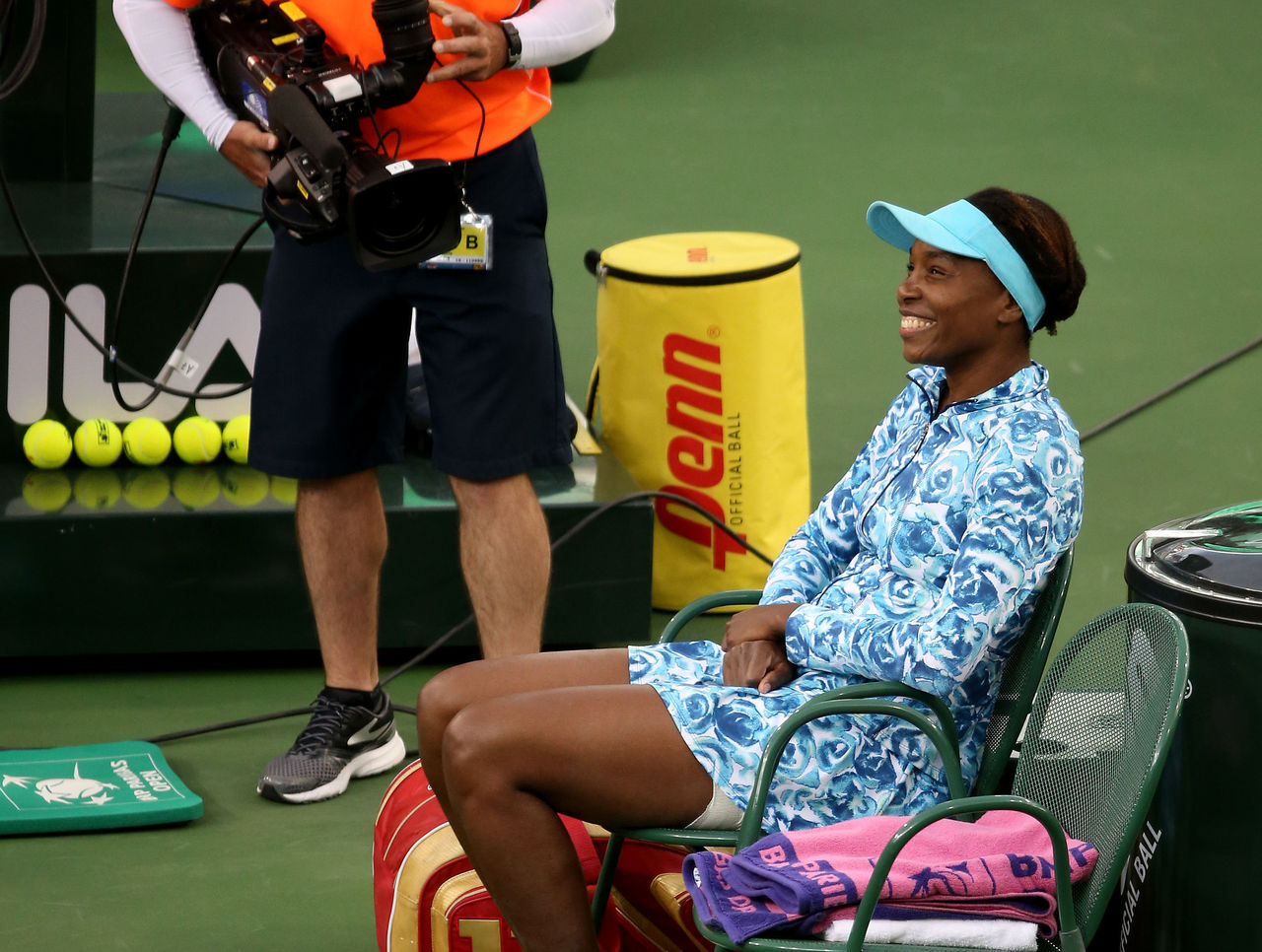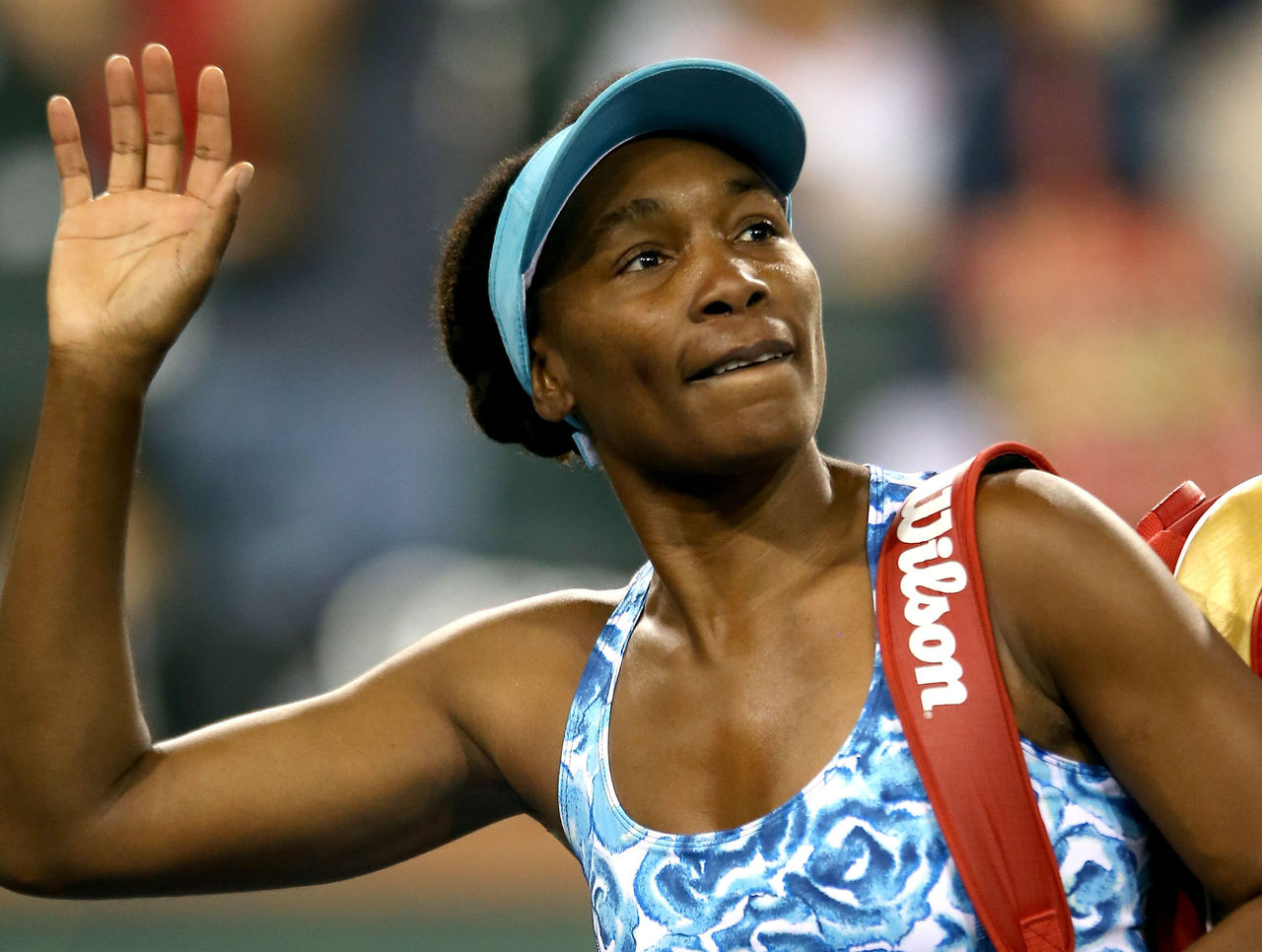'You can always go home': Venus Williams' short-lived Indian Wells return
On a cold, blustery, rainy Friday night in the desert, a night whose sullen conditions could've been taken as pathetic fallacy reflecting the on-court outcome (though they didn't much dim the overall glow of the occasion), Venus Williams finally ended her 15-year Indian Wells boycott.
She was following her little sister's lead, but in her own way. Serena loudly ended her boycott a year ago, announcing her intention in a TIME magazine article published to much fanfare in February. Venus simply signed up for the tournament at the start of the year, then two months later wrote a Players' Tribune essay explaining her decision. Meanwhile, her return ended up playing out in the shadow of the elephant that is Maria Sharapova's failed drug test, which is all anyone seems to be getting asked about right now. Compared to Serena's return, it was rather unassuming.
Perhaps that's fitting. Venus has always been the quieter one. She hasn't courted the spotlight the way Serena (intentionally or unintentionally) has. Venus has always seemed more contained, more within herself, more private, less vulnerable. Where Serena has been so plainly (sometimes painfully) visible, Venus has been a bit of a cipher.

"On the court, Serena is much more emotional than I am - and everyone sees her competitive side a lot more than they see mine," Venus wrote. "But that doesn’t mean I'm not emotional, and that doesn't mean I'm not competitive. I think I'm just … more instinctively quiet about it.
"And honestly, in my own way, I might even be the more competitive of the two of us. I think that Serena's ability to lay everything bare on the court allows her to work through her emotions more easily. For me, though, it can be a more conflicted process. My quietness lets me stew a little in my thoughts. And once I feel a certain way about something, my competitiveness can make me a little slower to come around to the other side.
"And that's how it was for me with Indian Wells."
The boycott's origin is well-trod ground: In 2001, Serena and Venus were set to play the semis at Indian Wells, but Venus pulled out just before the match due to a knee injury. The fans in attendance made their displeasure known, on that day but especially the day following, when they booed Serena throughout her win over Kim Clijsters in the final. They booed Venus, too, who was in the stands as a spectator. Their father, Richard Williams, who early in his daughters' careers was regularly (and baselessly) accused of fixing the outcomes of their head-to-head matches, said he was berated with racial epithets during the whole sordid ordeal. Venus was 20 at the time, Serena 19. They were kids. And though they were playing in their home state, nothing about the experience made them feel at home.
"I remember leaving Indian Wells in 2001 feeling like I wasn't welcome there," Venus wrote. "Not feeling welcome somewhere is a hard memory to let go of - at any age. At 20? It's almost impossible. And so that's what I did. I held onto it."
So it was hard not to get goosebumps when a 35-year-old Venus strode onto the Stadium 1 court Friday to a torrent of applause, looking downright regal in her assurance; when she reached her chair, waved to the crowd, and put a hand over her heart.
15 years later... pic.twitter.com/hpeEE0qNa2
— WTA Reactions (@WTAreactions) March 12, 2016
She took her time to soak it all in, and couldn't seem to stop grinning.

And then she went out and played an abysmal match, losing in straights to an 89th-ranked qualifier named Kurumi Nara who hadn't won a set in their two previous matches. As Venus said afterwards, "not everything can end fairy-tale."
Venus was plainly nervous, just like Serena was in her opening match a year ago, when she got down early to Monica Niculescu. But Venus, while still a top player on many days, doesn't have the luxuries Serena has as a player; the intimidation factor, the air of inexorability, the ability to flip the switch at a moment's notice (it doesn't help that she has to deal with an energy-sapping autoimmune disorder), or the propensity to play most ferociously when her back's against the wall. Unlike Serena, when Venus doesn't play well, she loses.
On Friday, she had to fight the gusty conditions, a momentum-busting rain delay, and herself. She sprayed ugly unforced errors from both wings, and her serve was in tatters. Four times she managed to break Nara. Each time she was re-broken in her following service game. Nara didn't have to do much. She was solid, consistent, and totally unspectacular.
It would've been nice if Venus' run could've lasted a little longer; if she and Serena - who just a couple hours after her sister's loss obliterated Laura Siegemund on the same court - could've met in the quarters, as their draw had set them up to do. But Venus isn't walking away with a sour taste in her mouth.
"Just being here, just being on the practice court and on site has been so positive and such a great experience," she said. "It just shows that, yeah, you know, that you can always come back home, I guess. You can always go home."
Is that forgiveness? At the least, it's an acknowledgment that the past can stay the past, and that the present needn't be beholden to it. It's a commitment to moving on. That doesn't necessarily mean forgiving, and it certainly doesn't mean forgetting. A memory that bitter, and an ensuing decade-and-a-half of avoidance, doesn't get erased by one night of warm fuzzies. But the bridge is being mended. It's a start.
"Fifteen years later, to have such a joyous return is more than I could have ever ... It's such a blessing," Venus said.
"It would have been an even better moment to have a win and share that moment with the crowd, who have been so supportive and just so amazing. ... Sometimes, there's a little bit of a glitch. Doesn't mean that I can't come back next year and try to do even better."

Next year. Surely the tournament organizers rejoiced at hearing those two words.
They've gone from having zero Williams sisters to having two in the span of a year, and that's a pretty massive optical improvement. Because for a tournament that prides itself on capital-P Prestige, boasts of its lucrative prize pool, and fancies itself the Fifth Major, being absent the two biggest winners on the women's tour (Venus hasn't won much lately, but she's still a comfortable second to Serena in active singles titles) year after year, made it harder to sell its credibility.
Their return is undeniably great news for the tournament, and for the sport. But for Venus and Serena, it isn't objectively good or bad. It's just what they chose. And, to quote a former player who dealt with his own share of scrutiny, "no matter what your life is, choosing it changes everything."
They didn't need to come back. Neither had any responsibility - be it professional or social - to end the boycott. It wasn't on them to set an example for others, as Serena hopes they've done. No sensible person would've begrudged them never returning to the scene of such a dark incident in their lives. The tournament needed them far more than they needed it.
Maybe, in some small way, that's part of what makes the whole thing satisfying. They returned, on their own terms, to a place that had gone from shunning them in the worst way to needing them back. And Venus, like Serena before her, got to savor her triumphant, cathartic moment of reconciliation. Because it's what she wanted. Because she chose it.
HEADLINES
- Giddey ties career-high with 5 triples to lead Bulls past Cavaliers
- Faulk scores only goal, Hofer makes 24 saves to help Blues blank Jets
- TNF bets: Seahawks host Rams for high-stakes NFC West clash
- Bears exploring potential stadium sites in Northwest Indiana
- Rookie Ward hopes to be involved in Titans' coaching search